Andrew Furst's Blog, page 147
February 3, 2015
Compass Songs – A Note to Harold Fondren
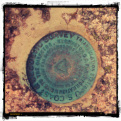 Compass Songs is an ongoing series of works by poets that I enjoy. Poetry, as the Zen Masters have said, is like a finger pointing to the moon. It speaks the unspeakable.
Compass Songs is an ongoing series of works by poets that I enjoy. Poetry, as the Zen Masters have said, is like a finger pointing to the moon. It speaks the unspeakable.A Note to Harold Fondren
by Frank O’Hara
The sky flows over Kentucky and Maryland
like a river of riches and nobility
free as grass. Our thoughts move
steadily over the land of our birth.
Ours is a moral landscape. We
breathe deeply, crowded with values.
We love the world, and it feels a cultivation
like a golden bridle under our touch.
At night the earth gives itself over
into our protecting hands. And the same sun
rises every morning. Our responsibility
is continuous. And painful. But it lingers
just above us and scents everything
like the spoor of a brave animal. We seed
the land and its art without being prodigal
and are ourselves its necessity and flower.
First Name:
Last Name:
Email address:
Select a Weekly Series You'd Like to Follow:
One Minute Meditations
Tiny Drops (Photography series)
Compass Songs (My Favorite Poems)
Dialectic Two-Step
Modern Koans (interesting questions)
Sunday Morning Coming Down (Music Videos)
Relics (Timeless Republished Articles)
The post Compass Songs – A Note to Harold Fondren appeared first on Andrew Furst.
February 2, 2015
Compass Songs – Shoveling Snow With Buddha
 Compass Songs is an ongoing series of works by poets that I enjoy. Poetry, as the Zen Masters have said, is like a finger pointing to the moon. It speaks the unspeakable.
Compass Songs is an ongoing series of works by poets that I enjoy. Poetry, as the Zen Masters have said, is like a finger pointing to the moon. It speaks the unspeakable.A special edition of Compass songs. Borrowed from a sermon mention by Rev. Tim Kutzmark at my UU church. Thanks to Rick Wetzler for pointing it out. Seemed appropriate today
Shoveling Snow With Buddhaby Billy Collins
In the usual iconography of the temple or the local Wok
you would never see him doing such a thing,
tossing the dry snow over a mountain
of his bare, round shoulder,
his hair tied in a knot,
a model of concentration.
Sitting is more his speed, if that is the word
for what he does, or does not do.
Even the season is wrong for him.
In all his manifestations, is it not warm or slightly humid?
Is this not implied by his serene expression,
that smile so wide it wraps itself around the waist of the universe?
But here we are, working our way down the driveway,
one shovelful at a time.
We toss the light powder into the clear air.
We feel the cold mist on our faces.
And with every heave we disappear
and become lost to each other
in these sudden clouds of our own making,
these fountain-bursts of snow.
This is so much better than a sermon in church,
I say out loud, but Buddha keeps on shoveling.
This is the true religion, the religion of snow,
and sunlight and winter geese barking in the sky,
I say, but he is too busy to hear me.
He has thrown himself into shoveling snow
as if it were the purpose of existence,
as if the sign of a perfect life were a clear driveway
you could back the car down easily
and drive off into the vanities of the world
with a broken heater fan and a song on the radio.
All morning long we work side by side,
me with my commentary
and he inside his generous pocket of silence,
until the hour is nearly noon
and the snow is piled high all around us;
then, I hear him speak.
After this, he asks,
can we go inside and play cards?
Certainly, I reply, and I will heat some milk
and bring cups of hot chocolate to the table
while you shuffle the deck.
and our boots stand dripping by the door.
Aaah, says the Buddha, lifting his eyes
and leaning for a moment on his shovel
before he drives the thin blade again
deep into the glittering white snow.
– Billy Collins
Get Each Week's Compass Song in your email boxFirst Name:
Last Name:
Email address:
Select a Weekly Series You'd Like to Follow:
One Minute Meditations
Tiny Drops (Photography series)
Compass Songs (My Favorite Poems)
Dialectic Two-Step
Modern Koans (interesting questions)
Sunday Morning Coming Down (Music Videos)
Relics (Timeless Republished Articles)
[/su_accordion]
The post Compass Songs – Shoveling Snow With Buddha appeared first on Andrew Furst.
Dialectic Two-Step – The More We Suffer, the More Human We Become?
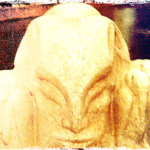 Dialectic Two-Step is an ongoing series of my thoughts on questions that come my way.
Dialectic Two-Step is an ongoing series of my thoughts on questions that come my way.Wisdom lies neither in fixity nor in change, but in the dialectic between the two. – Octavio Paz
Some time ago, I answered a question on Quora about how we suffer as humans, The question read as follows:
Question: What philosophy states that “the more we suffer, the more human we become”?
Here is how I responded
Answer: I’m not sure I can place it into a philosophy in the academic sense. Putting on my philosopher hat, I would be looking for clarification on what it means to be more human vs. less human. I think William Ranger’s answer is heading in the right direction if we would be willing to adjust the question to something like:
“The more we suffer, the more opportunity we have to understand who we really are”
If we carefully observe our suffering and make an effort to determine it’s causes, we learn a few things:
1. We are often the cause of our own suffering. Of course, we have little control over disease, aging, and death, but our day to day suffering is usually the product of our attachments and aversions.
2. Part of this self generated suffering is caused by an incorrect view of who we really are. We live life like we’re immortal and forever young. We take for granted the beauty and abundance around us . We manage to miss it or even worse find it dissatisfying. We somehow snatch failure from the jaws of success.
If we’re willing to act on our backwards behavior, and live as a real human – mortal, frail, and blessed – we can only come closer to bliss. As William states , “Anyone can maximize her/her degree of freedom. The method is [simple (not easy)], and free.”
Get Each Week's Dialectic Two Step in your email boxFirst Name:
Last Name:
Email address:
Select a Weekly Series You'd Like to Follow:
One Minute Meditations
Tiny Drops (Photography series)
Compass Songs (My Favorite Poems)
Dialectic Two-Step
Modern Koans (interesting questions)
Sunday Morning Coming Down (Music Videos)
Relics (Timeless Republished Articles)
The post Dialectic Two-Step – The More We Suffer, the More Human We Become? appeared first on Andrew Furst.
February 1, 2015
One Minute Meditation – Dragon Brook – Part II
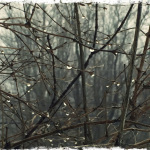 One Minute Meditations is an ongoing series of short videos, poems, and commentary intended as a meditation. Offered as an opportunity to step back from your cyber routine and settle into a more natural rhythm, if only for a minute. Dragon Brook II
One Minute Meditations is an ongoing series of short videos, poems, and commentary intended as a meditation. Offered as an opportunity to step back from your cyber routine and settle into a more natural rhythm, if only for a minute. Dragon Brook II
In the second half of this two part series of videos , the perspective shifts.
Previously I said:
“Sometimes everything can be going your way. When you need something, it can just show up at the right time. Other times it seems like life has left you behind. You can only stand there and watch as it moves on without you.”
Here the brook is rushing away from us. How does this feel? There is absolutely a different quality to it. While the sound of the water was still lovely, I noticed a sense of loss. It was as though the water moving away from me was draining the life from me, as blood from a wound in my heart.
How can a shift in perspective create such an emotional change. From joy, to sadness. From a sense of being cared for, to a feeling of being neglected? Such is the power of our point of view.
Is it a shift from facing east to west? Or is it a shift in the mind?
Where Is My Mind?The riddles of God are more satisfying than the solutions of man – G. K. Chesterton
Perception holds keys
But the door remains hidden
ebb and flow we must
First Name:
Last Name:
Email address:
Select a Weekly Series You'd Like to Follow:
One Minute Meditations
Tiny Drops (Photography series)
Compass Songs (My Favorite Poems)
Dialectic Two-Step
Modern Koans (interesting questions)
Sunday Morning Coming Down (Music Videos)
Relics (Timeless Republished Articles)
The post One Minute Meditation – Dragon Brook – Part II appeared first on Andrew Furst.
Sunday Morning Coming Down
 Sunday Morning Coming Down is an ongoing music video series. The songs fit my definition of music for a lazy couch bound Sunday morning.
Sunday Morning Coming Down is an ongoing music video series. The songs fit my definition of music for a lazy couch bound Sunday morning.Of course, this series could not be complete without a listen to the song that inspired it. For me, Johnny Cash’s cover of Sunday Morning Coming Down carries with it a rich set of memories. Have a listen.
Sunday Morning Coming DownGet Each Week's Sunday Morning Coming Down in your email boxFirst Name:
Last Name:
Email address:
Select a Weekly Series You'd Like to Follow:
One Minute Meditations
Tiny Drops (Photography series)
Compass Songs (My Favorite Poems)
Dialectic Two-Step
Modern Koans (interesting questions)
Sunday Morning Coming Down (Music Videos)
Relics (Timeless Republished Articles)
Sunday Morning Coming Down
written by Kris Kristofferson
Well, I woke up Sunday morning
With no way to hold my head that didn’t hurt
And the beer I had for breakfast wasn’t bad
So I had one more for dessert
Then I fumbled in my closet through my clothes
And found my cleanest dirty shirt
Then I washed my face and combed my hair
Stumbled down the stairs to meet the day
I’d smoked my mind the night before
With cigarettes and songs that I’d been pickin’
But I lit my first and watched a small kid
Playing with a can that he was kicking
Then I walked across the street
And caught the Sunday smell of someone fryin’ chicken
And oh it took me back to somethin’
That I’d lost somewhere, somehow along the way
On a Sunday morning sidewalk
I’m wishing, Lord, that I was stoned
‘Cause there’s something in a Sunday
That makes a body feel alone
And there ain’t nothin’ short of dyin’
As half as lonesome as the sound
Of a sleepin’ city sidewalk
And Sunday mornings coming down
In the park, I saw a daddy
With a laughing little girl who he was swinging
And I stopped beside a Sunday school
And listened to the songs that they were singing
Then I headed down the streets
And somewhere far away a lonely bell was ringing
And it echoed through the canyons
Like the disappearing dreams of yesterday
On a Sunday morning sidewalk
Oh, I’m wishing, Lord, that I was stoned
‘Cause there’s something in a Sunday
That’ll make a body feel alone
And there ain’t nothin’ short of dyin’
Thats half as lonesome as the sound
Of a sleepin’ city sidewalk
And Sunday mornin’ comin’ down
The post Sunday Morning Coming Down appeared first on Andrew Furst.
January 31, 2015
Relics – Salvation Is What We Receive, Not What We Achieve
 The Relics series are throwback articles from previous years. They seem timeless enough to be relevant today.
The Relics series are throwback articles from previous years. They seem timeless enough to be relevant today.Salvation Is What We Receive, Not What We AchieveTry as you will, you cannot annihilate that eternal relic of the human heart, love. – Victor Hugo
I recently drove by a church on the way to work and saw a sign that said “Salvation is What We Receive, Not What We Achieve“. What a great message, even from a Buddhist point of view. Grace is a concept that I think is universal. It is the message of Pure Land Buddhism in a nutshell.
The Christian concept of grace is a source of division across various denominations, but is persistent throughout the entire faith. Catholics and Protestants have very differing opinions on grace, as do liberal and conservative theologians. Some Christians consider free will part of the equations others do not. Some believe we we may be able to choose to accept or reject grace. Some feel it depends on the faith of the individual, while others believe humans are completely hopeless but for the grace of God.
Pure Land Buddhism reflects a similar notion in our reliance on Other Power. In his book How to Read the Tannisho by Dr. Taitetsu Unno, he describes the Pure Land practice of reliance on Other Power :
The nembutsu (reciting the name of the Buddha), works in different ways at various junctures in one’s life. Awakening to Namu-amida butsu (Chinese: Namo Amitofo) solves difficulties in human relationships, ameliorates hardships and sufferings, provides wise counsel when confronted with difficult choices, inspires timely and compassionate action, transforms sorrow into joy, and gives us the power to see and criticize false social constructs. Living the nembutsu with full awareness of human limitedness leads us not to denigrate but to celebrate life within the boundless wisdom and compassion of Amida Buddha.
Embedded in this is the core teaching of Sakyamuni Buddha – anatta – or Not Self. When we look and act through the prism of the Self, we suffer. When we embrace interdependence, not self and Nirvana, we are taking refuge in Other Power, in Buddha Amitabha. If we surrender to the truth that we are utterly reliant upon others, gratitude and abundance arises. The weight of being lifts and we are enlightened.
Grace is there for all of us. We only need to choose to get out of its way.
Get Each Week's Relics article in your email boxFirst Name:
Last Name:
Email address:
Select a Weekly Series You'd Like to Follow:
One Minute Meditations
Tiny Drops (Photography series)
Compass Songs (My Favorite Poems)
Dialectic Two-Step
Modern Koans (interesting questions)
Sunday Morning Coming Down (Music Videos)
Relics (Timeless Republished Articles)
The post Relics – Salvation Is What We Receive, Not What We Achieve appeared first on Andrew Furst.
January 30, 2015
Modern Koans – If People Want To Be Happy, Why Do They Dwell On Negative Things?
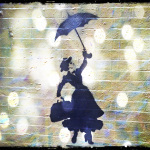 Modern Koans is an ongoing series that recognizes that good questions are often more important then their answers.
Modern Koans is an ongoing series that recognizes that good questions are often more important then their answers.The riddles of God are more satisfying than the solutions of man. ― G.K. Chesterton
Why Do We Dwell On Negative Things?It’s in our DNA. Worrying and dwelling on worst case scenarios are traits that help us to survive. If you’re always looking out for a predator, you’ll likely see it before your care free (and perhaps clueless) friend. Many of the traits that have helped us become such a successful species are also the traits that impede our ability to be happy.
It’s a bit of a conundrum, if you think about it. These traits are highly desirable, because they keep us alive. But they also constrain us in many ways. I’d suggest, as always it’s a balance, our DNA is reminding us that it’s not always hunky dory, and our innate desire for happiness is reminding us to stop and smell the roses.
How do you keep the balance between constructive worry and happiness?
What do you think? I’d love to hear your thoughts in the comments section below.Get Each Week's Modern Koan in your email boxFirst Name:
Last Name:
Email address:
Select a Weekly Series You'd Like to Follow:
One Minute Meditations
Tiny Drops (Photography series)
Compass Songs (My Favorite Poems)
Dialectic Two-Step
Modern Koans (interesting questions)
Sunday Morning Coming Down (Music Videos)
Relics (Timeless Republished Articles)
The post Modern Koans – If People Want To Be Happy, Why Do They Dwell On Negative Things? appeared first on Andrew Furst.
January 29, 2015
One Minute Meditation – The Old Pond
 One Minute Meditations is an ongoing series of short videos, poems, and commentary intended as a meditation. Offered as an opportunity to step back from your cyber routine and settle into a more natural rhythm, if only for a minute. The Old Pond
One Minute Meditations is an ongoing series of short videos, poems, and commentary intended as a meditation. Offered as an opportunity to step back from your cyber routine and settle into a more natural rhythm, if only for a minute. The Old Pond
Furuike ya
kawazu tobikomu
mizu no oto
– Matsuo BashoEnglish Translation
The old pond–
a frog jumps in,
sound of water
-Translated by Fumiko Saisho Get Each Week's One Minute Meditation in your email box
First Name:
Last Name:
Email address:
Select a Weekly Series You'd Like to Follow:
One Minute Meditations
Tiny Drops (Photography series)
Compass Songs (My Favorite Poems)
Dialectic Two-Step
Modern Koans (interesting questions)
Sunday Morning Coming Down (Music Videos)
Relics (Timeless Republished Articles)
The post One Minute Meditation – The Old Pond appeared first on Andrew Furst.
January 28, 2015
Tiny Drops – Harvest Fades
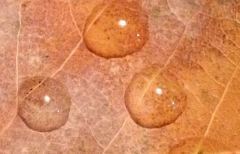 Tiny Drops is an ongoing iPhoneographic series. The images represent moments of noticing on my part. For you, they are an offer to pause, observe, and take that noticing into your life. All photos are mine unless noted otherwise.
Tiny Drops is an ongoing iPhoneographic series. The images represent moments of noticing on my part. For you, they are an offer to pause, observe, and take that noticing into your life. All photos are mine unless noted otherwise. These works by Andrew Furst are licensed under a Creative Commons Attribution-NonCommercial-ShareAlike 4.0 International License.Harvest Fades
These works by Andrew Furst are licensed under a Creative Commons Attribution-NonCommercial-ShareAlike 4.0 International License.Harvest Fades
Click on images to view the full size slide show.
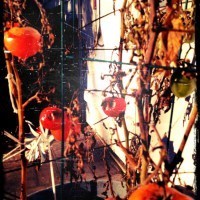 tomatoes
tomatoes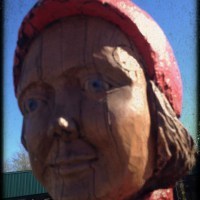 sign boy sand
sign boy sand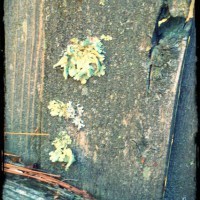 fence 2 sophia cornered
fence 2 sophia cornered bowling lanes filter
bowling lanes filter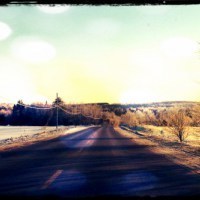 route 7 anne
route 7 anne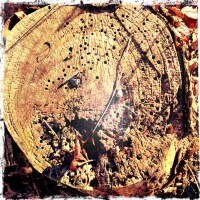 tree stump filterGet Each Week's Tiny Drops in your email box
tree stump filterGet Each Week's Tiny Drops in your email boxFirst Name:
Last Name:
Email address:
Select a Weekly Series You'd Like to Follow:
One Minute Meditations
Tiny Drops (Photography series)
Compass Songs (My Favorite Poems)
Dialectic Two-Step
Modern Koans (interesting questions)
Sunday Morning Coming Down (Music Videos)
Relics (Timeless Republished Articles)
FIVE LIMITLESS THOUGHTS
May all living beings have happiness and its causes
May all be free from unhappiness and its causes
May all dwell in equanimity, free of attraction and aversion
May all quickly find the great happiness that lies beyond all misery
May all enjoy inner and outer peace now and forever
NAMO AMITOFOThe post Tiny Drops – Harvest Fades appeared first on Andrew Furst.
January 27, 2015
Compass Songs – Pablo Neruda – Sonnet XVII
 Compass Songs is an ongoing series of works by poets that I enjoy. Poetry, as the Zen Masters have said, is like a finger pointing to the moon. It speaks the unspeakable.
Compass Songs is an ongoing series of works by poets that I enjoy. Poetry, as the Zen Masters have said, is like a finger pointing to the moon. It speaks the unspeakable.Sonnet XVII
by Pablo Neruda
I do not love you as if you were salt-rose, or topaz,
or the arrow of carnations the fire shoots off.
I love you as certain dark things are to be loved,
in secret, between the shadow and the soul.
I love you as the plant that never blooms
but carries in itself the light of hidden flowers;
thanks to your love a certain solid fragrance,
risen from the earth, lives darkly in my body.
I love you without knowing how, or when, or from where.
I love you straightforwardly, without complexities or pride;
so I love you because I know no other way
than this: where I does not exist, nor you,
so close that your hand on my chest is my hand,
so close that your eyes close as I fall asleep.
First Name:
Last Name:
Email address:
Select a Weekly Series You'd Like to Follow:
One Minute Meditations
Tiny Drops (Photography series)
Compass Songs (My Favorite Poems)
Dialectic Two-Step
Modern Koans (interesting questions)
Sunday Morning Coming Down (Music Videos)
Relics (Timeless Republished Articles)
The post Compass Songs – Pablo Neruda – Sonnet XVII appeared first on Andrew Furst.



